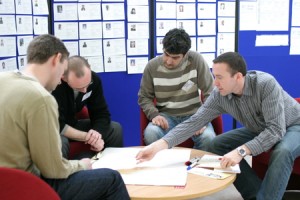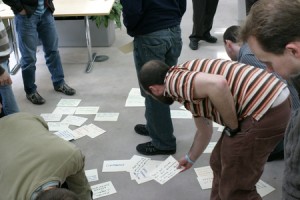Why running a session at SPA is a good idea
I’m co-programme chair for the Software Practice Advancement conference in London on June 12-15, together with Rob Bowley. The call for sessions is open until February 28. Read Rob’s “a quite unique conference” to see why attending SPA is fun, and amazing value for money.
Why is running a session at SPA a good idea? Because you will lay awake at night after having a nightmare of rowdy SPA regulars tearing your session apart? Not only that ![]() Running a session here is an excellent way to learn, and since the conference is relatively small, there is ample opportunity to continue working on your ideas after hours. SPA attendees are critical, curious and have lots of experience, which can make your session interesting in various ways
Running a session here is an excellent way to learn, and since the conference is relatively small, there is ample opportunity to continue working on your ideas after hours. SPA attendees are critical, curious and have lots of experience, which can make your session interesting in various ways ![]() .
.
In case you have not organized a session at SPA before and are interested in running one, I’d like to highlight some things that are different compared to most other conferences:
The level of interactivity of most sessions – with interactivity we don’t just mean questions and answer blocks within sessions, but participants actively involved through hands-on exercises, dialogue (through e.g. fishbowl discussions), and simulations. We sometimes allow presentations, but this is the exception, not the rule. The SPA site has a list formats with explanation, and we are open to new formats, so be creative!
SPA participants are highly experienced and educated. This means they have seen fads come and go, and take nothing at face value. If you use this well, this can make your session an experience you won’t soon forget. If you use this badly, this can make your session an experience
you won’t soon forget ![]() . Be prepared for vocal, and sometimes rowdy (in a good natured sense) participants.
. Be prepared for vocal, and sometimes rowdy (in a good natured sense) participants.
And some things to consider when writing a session proposal:
A session proposal has a couple of audiences:
- You, sitting down to write your idea for a session makes it brutally concrete
- Prospective attendees : why should they attend your session? What can they learn? How is it going to be fun? You will have the opportunity to edit the participant facing part of your description after it is accepted.
- Reviewers: How will this session work? Is it feasible in the time? Will it be fun? How can participants contribute?
- The program committee: does it fit in the program this year? Does it have enough SPA-ness?
You can ask participants to prepare something in advance (e.g.position papers, experience reports, code samples, even exercises). We
will keep the number of sessions that require this kind of preparation limited: SPA attendees are usually quite busy; your session proposal
should also include a backup plan in case there is not much prepared work sent in, and should usually accept attendees who did not prepare something in advance (we are of course willing to make exceptions – like participants, each session is unique).
SPA is a conference that has been long running, so it has some traditions. The session proposal form is pretty long and detailed. My take on it, is that it forces you to think through at least a couple of concerns related to your session. However, don’t let this stop you from doing something extracurricular ![]() , e.g. writing a blog post to describe your idea, or putting up a screencast of you coding (in case there is coding) on youtube or vimeo.
, e.g. writing a blog post to describe your idea, or putting up a screencast of you coding (in case there is coding) on youtube or vimeo.
Finally, a disclaimer by the voice of reason: even when we encourage you to work your idea out into a full-blown session proposal, it still might not be accepted. Eventually a review committee consisting of SPA regulars will decide whether your session is a good fit for this years’ programme and has sufficient ‘SPA-ness’.
This is not to discourage you. Running a session at SPA is usually a lot of fun! I often find it very rewarding (especially running the session. preparation a bit less…). You will get fairly detailed feedback on your proposal once it gets formally reviewed. Before that, you can get feedback from your peers and give it to them, so all the proposals get better. Finally, if your session gets accepted, we will assign a ‘shepherd’ to you; someone who has run a session at SPA before to support you in the final preparation. We also ask the participants to give feedback on the session when you run it, which we will pass on to you as well.
If you’ve made it this far: congratulations! Now head over to the SPA conference website and put in a draft: you can iterate on it after your first post, so a title and abstract are enough to get started!
I look forward to seeing your sessions arrive! In case you have any questions, don’t hesitate to contact Rob and me.


